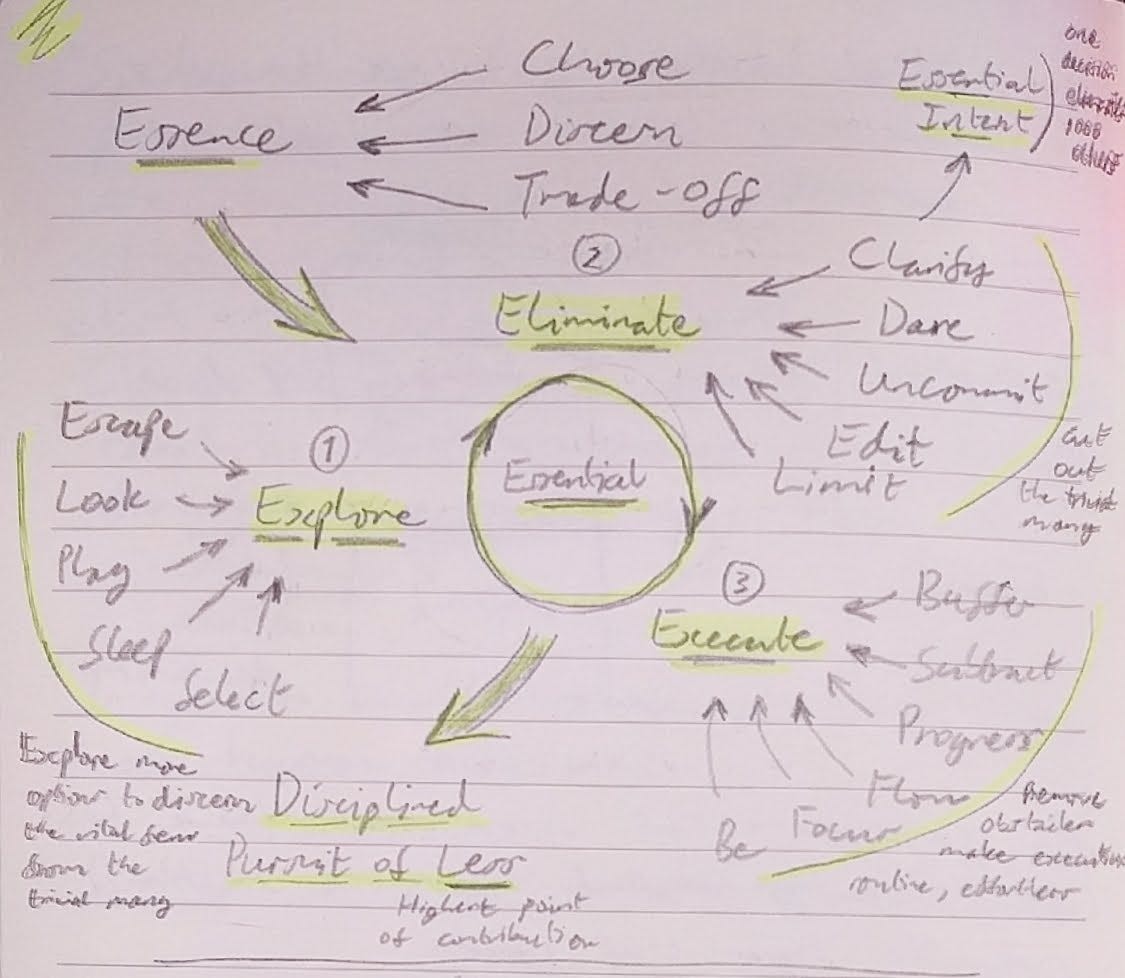Essentialism — The Disciplined Pursuit of Less

Notes from the book, Essentialism by Greg McKeown.
The problem is that we have too many choices, too much social pressure, and believe we can “have it all”.
If you don’t prioritise your life, someone else will.
Our lives get cluttered with well-intended commitments and activities that do not have an expiry date, consequently we need a system to clean up.
Disciplined Pursuit of Less
- Explore and Evaluate — will this activity or effort make the highest possible contribution towards my goal?
- Eliminate — don’t overvalue things due to the sunk cost bias, re-evaluate by asking “if I didn’t already own this how much would I spend to buy it?”. Then actively eliminate it if it is not valuable.
- Execute — once you’ve figured out which commitments and activities to keep you need a system to that makes executing your intentions effortless.
Essentialism is a discipline you apply each and every time your are faced with a decision about whether to say yes or whether to politely decline. It’s a method for making the tough trade-off between lots of good things and few really great things. It’s about learning to do less but better so you can achieve the highest possible return on every precious moment of your life.
The core mindset of the essentialist considers three realities:
- Individual choice — we can choose how to spend our time and energy.
- Prevalence of noise — almost everything is noise, and a very few things are exceptionally valuable.
- Reality of trade-offs — we can’t have it all or do it all.


Explore — explore more options. The purpose of exploration is to discern the vital few from the trivial many. Ask yourself “What do I feel deeply inspired by?”, “What am I particularly talented at?”, “What meets a significant need in the world?”
Eliminate — cut out the trivial many. This means saying no and making trade-offs. The real question is not how can we do it all, it is who will get to choose what we do and don’t do? Deliberately choose what not to do or allow yourself to be pulled in directions you do not want to go. Eliminating non-essentials earns you the time necessary to achieve what is essential.
Execute — remove obstacles, make execution effortless. Invest the time you have saved by eliminating non-essentials into creating a system for removing obstacles and making execution effortless.
The book provides specific techniques for Explore, Eliminate and Execute.
“You cannot overestimate the unimportance of practically everything” — John Maxwell
Be definition a trade-off involves two things we want. Essentialists ask the tough and liberating question: “Which problem do I want?”
On the importance of keeping a journal. Nora Ephron: “I realized that journalism was not just about regurgitating the facts but about figuring out the point. It wasn’t enough to know who, what, when, and where; you had to understand what it meant. And why it mattered.”
Keeping a journal stops you from hyper-focusing on minor details and you see the bigger picture. Train yourself to look for “the lead” and be able to see what you missed.
The faintest pencil is better than the strongest memory — keep a journal
Essentialist are powerful observers and listeners.
Clarify the question to avoid a non-essential spiral of further vagueness and misinformation: “What question are you trying to answer?”
Essential Intent
Essential Intent makes 1 decision that eliminates 1,000 other decisions

Your Essential Intent must be inspirational, concrete, meaningful and measurable.
- Bland + General = Value Statement
- Bland + Concrete = Quarterly Objective
- Inspirational + General = Vision/Mission Statement
- Inspirational + Concrete = Essential Intent
Your Essential Intent does not have to be elegantly crafted; it’s the substance not the style that matters.
Ask yourself: “If I could be truly excellent at only one thing, what would it be?”
The absolute fastest way to complete a task or reach an objective is to realise you don’t have to.
Essentialist Leadership
- Fewer things done better.
- Communicating the right information to the right people at the right time.
- Speed and quality for decision making.
